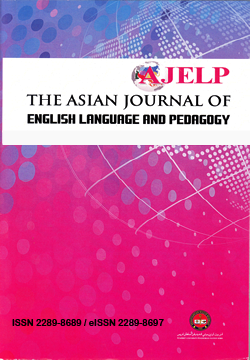Relationship between English learning motivation and English proficiency: A Study of Chinese ethnic minority learners
DOI:
https://doi.org/10.37134/ajelp.vol11.2.7.2023Keywords:
English proficiency, ethnic minority learners, motivation, rural ChinaAbstract
Language learning motivation plays a critical role in a successful language learning process. Research into foreign/second language learning motivation has been a focal point in the field of foreign/second language acquisition for long. Over the past twenty years, there has been a substantial body of research dedicated to motivation, conducted across various social and cultural contexts. These studies have played a crucial role in exploring the factors that impact learners’ motivation to acquire a foreign language, as well as in examining the intricate relationship between motivation and other facets of foreign language learning. Foreign language proficiency is seen as the ultimate aim of foreign language learning. Some studies have delved into the relationship between foreign language learning motivation and foreign language proficiency, and no agreement has been reached yet. Nonetheless, there exists a notable dearth of research concerning the relationship between English learning motivation and English language proficiency of Chinese ethnic minority learners who have minority language as native language, Mandarin as national language, and learn English as a foreign language. To address this gap, a quantitative study was undertaken to identify if there is relationship between English learning motivation and English proficiency among ethnic minority learners in rural China. Pearson correlation coefficients were performed on the data which were collected from English learner questionnaire and English proficiency test. The findings revealed that there is no relationship between the participants’ English learning motivation and English proficiency. The findings can be treated as evidence that high level of English learning motivation may not always contribute to good English proficiency. Researchers should concern more about motivation in relation to English proficiency. The results of this study provide implications for both policymakers and English educators in ethnic minority regions of China.
Downloads
References
Al-Hoorie, A. H. (2018). The L2 motivational self system: A meta-analysis. Studies in Second Language Learning and Teaching, 8(4), 721-754.
Al-Hoorie, A.H., & Szabó, F. (Eds.). (2022). Researching language learning motivation: A concise guide. Bloomsbury.
Boo, Z., Dörnyei, Z., & Ryan, S. (2015). L2 motivation research 2005-2014: Understanding a publication surge and a changing landscape. System, 55, 147–157.
Chen, Y. (2019). L2 motivational self system,self-efficacy,language anxiety and motivated oral participation in class. Foreign Language Research, 1, 63-70.
Csizér K. (2019). The L2 Motivational Self System. In M. Lamb, K. Csizér, A. Henry & S. Ryan (Eds.), The palgrave handbook of motivation for language learning (pp. 245-264). Palgrave Macmillan.
Dörnyei, Z. (2005). The Psychology of the Language Learner: Individual Differences in Second Language Acquisition. Lawrence Erlbaum.
Dörnyei, Z. (2007). Research methods in applied linguistics. Oxford University Press.
Dörnyei, Z. (2009). The L2 Motivational Self System. In Z. Dörnyei & E. Ushioda (Eds.), Motivation, language identity and the L2 self (pp. 9-42). Multilingual Matters.
Dörnyei, Z. (2010). Questionnaires in second language research: Construction, administration, and processing (2nd ed.). Routledge.
Gardner, R. C., & Lambert, W. E. (1972). Attitudes and motivation in second language learning. Rowley. Newbury House
Higgins, E. T. (1987). Self-discrepancy: A theory relating self and affect. Psychological Review, 94, 319–340.
Huo, W., & Rui, Y. P. (2020). The mediating effect of second language motivational self-system on self-efficacy and English proficiency. Journal of Xi’an International Studies University, 28(2), 54-58.
Irgatoğlu, A. (2021). L2 Motivational Self System and Learning Approaches of High School Students. Education Quarterly Reviews, 4(1), 240-252.
Islam, M., Lamb, M., & Chambers, G. (2013). The L2 motivational self system and national interest: A Pakistani perspective. System, 41, 231–244.
King, W. (2015). Does China have an English problem? Retrieved from 2017 from https://gbtimes.com/does-china-have-english-problem
Lamb, M., Csizér, K., Henry, A., & Ryan, S. (2019). The Palgrave handbook of motivation for language learning. Palgrave Macmillan.
Laohawiriyanon, C. (2019). The L2 Motivational Self System of Low and High Achievers in a Cambodian Context. PASAA: Journal of Language Teaching and Learning in Thailand, 57, 67-100.
Liu, Y., & Thompson, A. S. (2018). Language learning motivation in China: An exploration of the L2MSS and psychological reactance. System, 72, 37-48.
Markus, H., & Nurius, P. (1986). Possible selves. American Psychologist, 41(9), 954-969.
Ministry of Education of the People's Republic of China. (2019). Report on the development of China's education (2018-2019). Retrieved from http://www.moe.gov.cn/srcsite/A03/moe_843/201909/t20190923_398643.html
Moskovsky, C., Assulaimani, T., Racheva, S., & Harkins, J. (2016). The L2 motivational self system and L2 achievement: A study of Saudi EFL learners. The Modern Language Journal, 100(3), 641-654.
Roever, C., & Phakiti, A. (2017). Quantitative methods for second language research: A problem-solving approach. Routledge.
Ryan, R. M., & Deci, E. L. (2020). Intrinsic and extrinsic motivation from a self-determination theory perspective: Definitions, theory, practices, and future directions. Contemporary educational psychology, 61, 101860.
Taylan, H. (2017). The language learning motivation of university-level students regarding the L2 Motivational Self System at a Turkish university context. (Unpublished doctoral dissertation). University of Exeter.
Teng, Y. H., & Xu, H. (2015). A study on correlations between normal college students’ autonomous learning ability, motivation, and English academic achievements. Jiangsu Education Research, 12, 24-28.
The State Council of the People’s Republic of China. (2020). Retrieved from http://www.gov.cn/guoqing/2005-07/26/content_2663470.htm
You, C., & Dörnyei, Z. (2016). Language learning motivation in China: Results of a large-scale stratified survey. Applied Linguistics, 37(4), 495-519.
Zhou, M. L. (2003). Multilingualism in China: The politics of writing reforms for minority languages, 1949–2002. Mouton de Gruyter.
Downloads
Published
Issue
Section
License
Copyright (c) 2023 Ye Xincai, Noor Alhusna Madzlan, Liu Ying

This work is licensed under a Creative Commons Attribution-NonCommercial-ShareAlike 4.0 International License.





